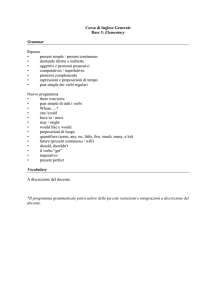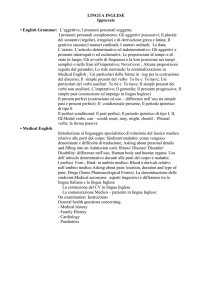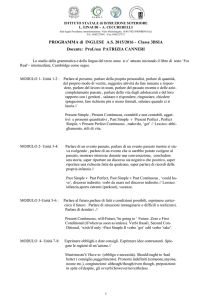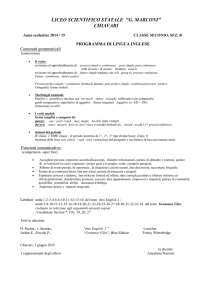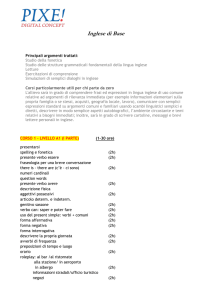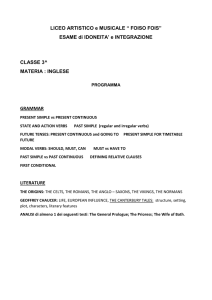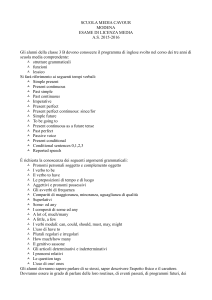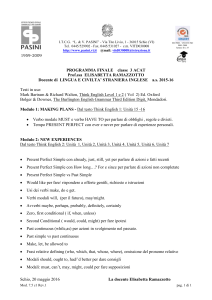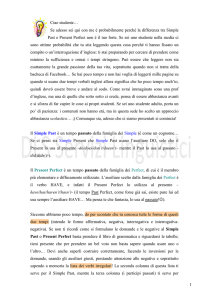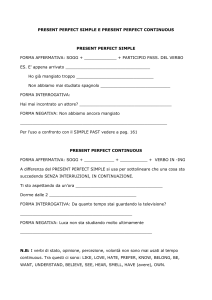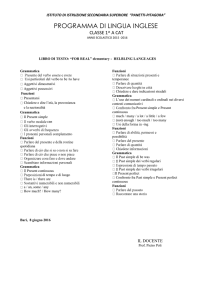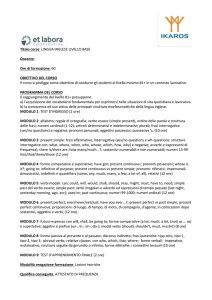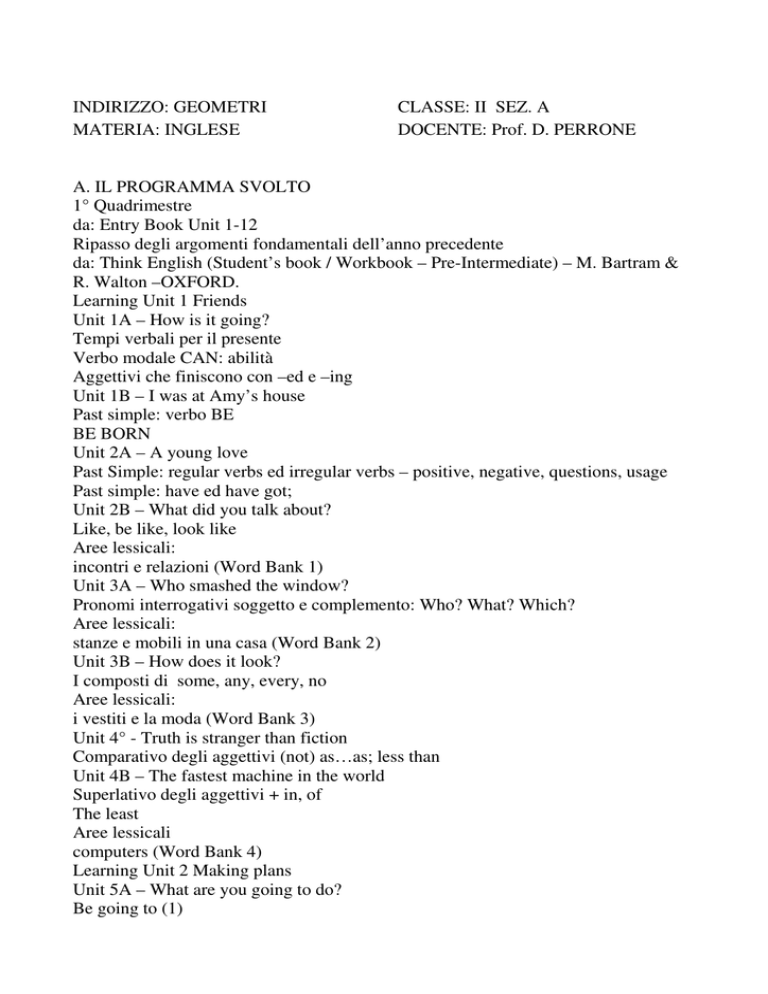
INDIRIZZO: GEOMETRI
MATERIA: INGLESE
CLASSE: II SEZ. A
DOCENTE: Prof. D. PERRONE
A. IL PROGRAMMA SVOLTO
1° Quadrimestre
da: Entry Book Unit 1-12
Ripasso degli argomenti fondamentali dell’anno precedente
da: Think English (Student’s book / Workbook – Pre-Intermediate) – M. Bartram &
R. Walton –OXFORD.
Learning Unit 1 Friends
Unit 1A – How is it going?
Tempi verbali per il presente
Verbo modale CAN: abilità
Aggettivi che finiscono con –ed e –ing
Unit 1B – I was at Amy’s house
Past simple: verbo BE
BE BORN
Unit 2A – A young love
Past Simple: regular verbs ed irregular verbs – positive, negative, questions, usage
Past simple: have ed have got;
Unit 2B – What did you talk about?
Like, be like, look like
Aree lessicali:
incontri e relazioni (Word Bank 1)
Unit 3A – Who smashed the window?
Pronomi interrogativi soggetto e complemento: Who? What? Which?
Aree lessicali:
stanze e mobili in una casa (Word Bank 2)
Unit 3B – How does it look?
I composti di some, any, every, no
Aree lessicali:
i vestiti e la moda (Word Bank 3)
Unit 4° - Truth is stranger than fiction
Comparativo degli aggettivi (not) as…as; less than
Unit 4B – The fastest machine in the world
Superlativo degli aggettivi + in, of
The least
Aree lessicali
computers (Word Bank 4)
Learning Unit 2 Making plans
Unit 5A – What are you going to do?
Be going to (1)
After, before, when, while, as soon as
Aree lessicali
linguaggio SMS (Word Bank 5)
Unit 5B – He is going to be mad…
Be going to (2)
About to ; Was going to
Civiltà:
I Teatri a Londra
2° Quadrimestre
Unit 6° - I’m leaving soon
present continuous for future
Present simple, present continuous for future and be going to
Unit 6B – At first, everything went well
Avverbi
Comparativi degli avverbi
Aree lessicali:
animali (Word Bank 6)
Unit 7A – I have to do everything!
Have to/don’t have to
Aree lessicali:
lavori domestici (Word Bank 7)
Unit 7B – We mustn’t get back late
Must; mustn’t vs don’t have to; must vs have to
Unit 8A: Have you ever sung karaoke?
Present perfect (1) evr, never
Past participles
have been vs have gone
Present perfect vs past simple
Unit 8B – I’ll keep in touch
Verbi modali: will, shall
Aree lessicali:
veicoli e trasporti (Word Bank 8)
Learning Unit 3 New experiences
Unit 9A - Have you met the team yet?
Present perfect + yet, already, just,; still vs yet
Unit 9B – What’s for?
Infinito di scopo
Scopo: for+ -ing
Unit 10A – I’ve been here since April
How long…?, for/since
Present perfect vs simple past: How long..?
Unit 10B – How long do you want to stay?
Would like
Aree lessicali:
vacanze (Word Bank 10)
Civiltà:
A guide to Wales (da: Think Culture pg 8-9)
The black death (da: Think Culture pg 25)
B:INDICAZIONI PER GLI STUDENTI CON DEBITO FORMATIVO
Si consiglia un ripasso generale, in particolare i seguenti argomenti facendo
riferimento alle unità sopraindicate:
present continuous for future (struttura ed uso), past simple ( essere-avere-verbi
regolari ed irregolari nella forma affermativa, negativa interrogativa e risposte brevi)
present simple vs present continuous (struttura ed uso), comparative adjectives and
superlatives adjectives regular and irregular, present perfect (stuttura ed uso), present
perfect vs simple past, to be going to (struttura ed uso), was going to, will (struttura
ed uso) Will vs be going to, present perfect + ever; never; yet; already; just; for and
since, indefinite, how long..? for/since.
Studiare ed esercitarsi ad esporre tutti gli approfondimenti culturali elencati nel
programma applicando le strutture grammaticali correttamente.
Si consiglia, inoltre, di curare il ripasso dei paradigmi e dei word banks.
Per esercitarsi si possono rifare tutti gli esercizi riguardo agli argomenti indicati sopra
per il recupero che sono stati assegnati durante l’anno scolastico e guardare dopo
l’esecuzione le correzioni fatte in classe.
Si ricorda che l’insegnante ha richiesto, durante l’anno scolastico, lo svolgimento di
tutti gli esercizi sul quaderno con l’indicazione della pagina, numero esercizio e
numero di frase per i motivi già spiegati ed anche in previsione di rendere il recupero
autonomo e più agevole.
Studiare ed esercitarsi ad esporre tutti gli approfondimenti culturali elencati nel
programma applicando le strutture grammaticali correttamente.

